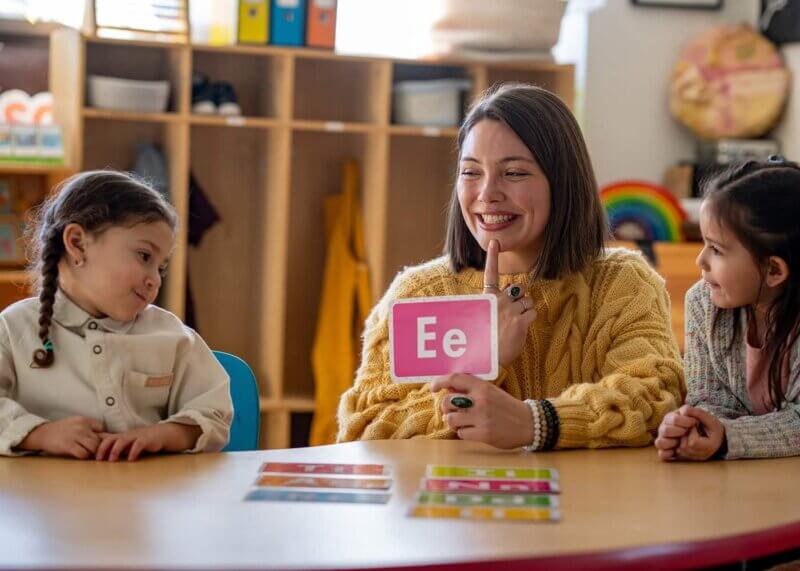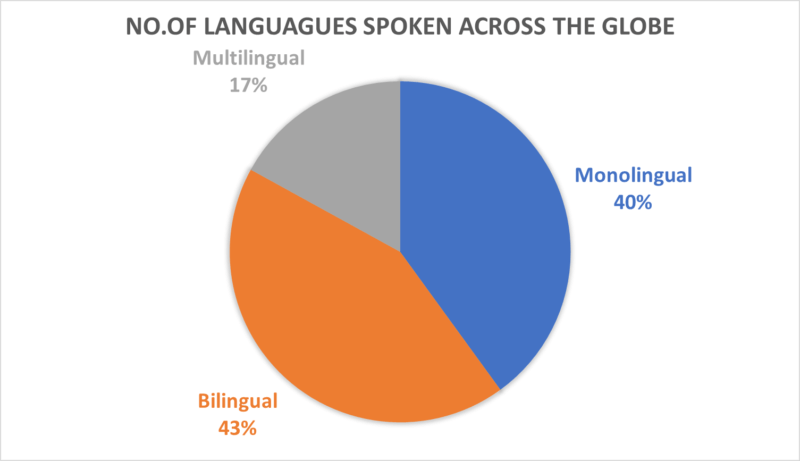
Autism and Bilingualism
According to Journal of Neurolinguistics, over half of the world’s population is bilingual (people who utilize two languages daily) if not multilingual, speaking 3 or more languages. Some statistics say 43% of the global population is bilingual, 40% is monolingual speaking only one language, and 17% are multilingual speaking several languages.

There have been many studies and articles citing the benefits of speaking more than one language such as enhanced cognitive abilities, improved communication skills, better job opportunities, increased cultural awareness, and the ability to connect with people from diverse backgrounds.
In the context of autism spectrum disorder where 30% of children are minimally verbal, language development is an area of challenge for many, and pragmatic language (social communication) is difficult for most autistic individuals, many people fear that speaking more than one language will hinder or affect language development. Parents may worry that their autistic child may not be able to learn more than one language. The good news is researchers have been studying this topic for just over a decade now and found that being exposed to two languages does not interfere with the language development of autistic children, and in fact, there are benefits to doing so.
In one study, researchers looked at the outcomes of verbal children on the autism spectrum, and compared children exposed to one versus two languages. Children exposed to two languages appeared to do as well as children exposed to only one language. We don’t have research yet around how variables related to autism and to bilingualism are taken into account such as the affect of bilingualism with non-speaking children. Socioeconomic status also plays a role in intellectual skills of bilingual autistic children.
Common Concerns/ Knowing the Facts
There are the answers to some common concerns around second language acquisition for autistic children.
- Growing up with more than one language will not confuse a child. Knowing one language helps a child to learn another.
- Bilingualism does not make learning each language harder. The brain doesn’t get confused and can separate two languages early in development.
- As a parent, speak the language you are most comfortable with. This is best for both parents and children. If important people in a child’s life speak more than one language, exposure to only one language isolates a child.
- Growing up with more than one language doesn’t hinder cognitive skills.
- Being raised with several languages helps a child connect with their family and community. There are many long term benefits to knowing a second language.
- Assessments and supports for bilingual children should be done in both languages.
What are some tips for parents and caregivers of bilingual autistic children?
(First 4 tips from the Hanen Early Language Program, 2022)
- Expose the child to the language that is important to the family and community they are in. When parents stop speaking their native language with their child, it can result in the child not being able to understand or speak with extended family members or participate in their cultural community. Being exposed to the language(s) valued by the family can allow a child to participate more fully in their family and culture.
- Speak in the language you are most comfortable with. When adults speak in the language they are comfortable and fluent in, children will hear vocabulary, phrases, and the grammar of that language. This helps with language skill development. When speaking in a language you aren’t fluent in, it can make interactions more difficult with a child. Children learn language best when they are involved in meaningful interactions during everyday life with their caregivers.
- To learn a language, you have to be exposed to that language. To learn any language, you have to be exposed to that language a lot. A child will need regular opportunities to hear and use both languages.
- Enlist the support of a speech-language pathologist (SLP). Ideally, the best scenario is having an SLP who speaks both of the child’s languages. Don’t worry if you can’t find a bilingual SLP because you can learn strategies to use with a child in any language that will build a child’s communication, interaction, and play skills.
- Read to children. Reading books together in multiple languages can improve vocabulary as well as develop reading skills.
- No matter what language you are speaking, use simple language. Use language that a child will understand so they can build connections between words used in their everyday life.
- Acknowledge communication in both languages. When a child communicates with you, respond to them, regardless of what language they use. This will encourage a child to keep communicating with you.
- Use Augmentative and Alternative Communication (AAC) – Use of AAC does not hinder speech development, but instead helps teach the ways and reasons we communicate. AAC multiple language support is available.
How do bilingual environments support and benefit autistic children?
According to this study, some benefits are:
- Better perspective taking – an important tool for social communication
- Greater use of gestures to signify wants and needs
- More advanced skills in pretend play
- More cooing and vocalizing in toddlers
And this paper cites:
- Caretakers interacting in their native language may be able to be more responsive, use an increased variety of communication functions, convey more nuanced emotions, and expand on topics of interest; which can lead to better language modeling from the caretaker to the child.
- Children have the opportunity to interact with family members who speak other languages, participate fully in family gatherings, and benefit from enriched cultural identities.
Another study found that bilingual autistic children were better able to switch attention between two tasks than monolingual autistic peers (i.e. Sorting objects by color, then switching to sort by shape)
Educators can also support parents by showing the family that their language and culture are valued and that continued home language development is supported. Bring the home language into the classroom, even if it is by learning a greeting in the language. This may help the child feel that their language has value and purpose outside of the home. If an autistic child is capable and willing, have them teach their classmates a few phrases. This is another way to illustrate that their home language has a place at school and that it is valued. It also offers them an opportunity to be an expert and teach their peers. Educators can also have other children share their languages with the class. When a teacher embraces bilingualism, so will the students.
In conclusion, there are many reasons for championing bilingualism in autistic children. There is no research that supports speaking more than one language at home is detrimental to an autistic child. Keep talking, communicating and connecting!
Resources
Autism and Bilingualism – Can autistic people learn and use several languages? ( short video)
Autism and Bilingualism: Our Family’s Journey to Make it Possible
Foreign Language Study Can Benefit Students With Autism – Parent Perspective
Perspectives and Experiences of Autistic Multilingual Adults: A Qualitative Analysis
Webinar – Understanding the impact of bilingualism for autistic children
When Autism Meets Bilingualism
References
Autism and Bilingualism Website – https://autism-bilingualism.com/index.html
Capozzi-Davis, O. et al. (Winter 2020) Can Children with Autism Spectrum Disorder Be Bilingual? Canadian Teacher Magazine
Jayakrishna Kasturi, V. (October 28, 2022) Are you wondering if bilingualism for children diagnosed with Autism Spectrum Disorder is difficult? 1 Special Place
Lowry, L. (2022) © Hanen Early Language Program. Can Children on the Autism Spectrum Learn Two Languages?
Sorenson Duncan, T et al. Bilingualism and students with ASD: A world with possibilities. APSEA Webinar
University of Washington Autism Center. Bilingualism and Autism Spectrum Disorder: What the Research Tells Us
Editorial Policy: Autism Awareness Centre believes that education is the key to success in assisting individuals who have autism and related disorders. Autism Awareness Centre’s mission is to ensure our extensive autism resource selection features the newest titles available in North America. Note that the information contained on this web site should not be used as a substitute for medical care and advice.
